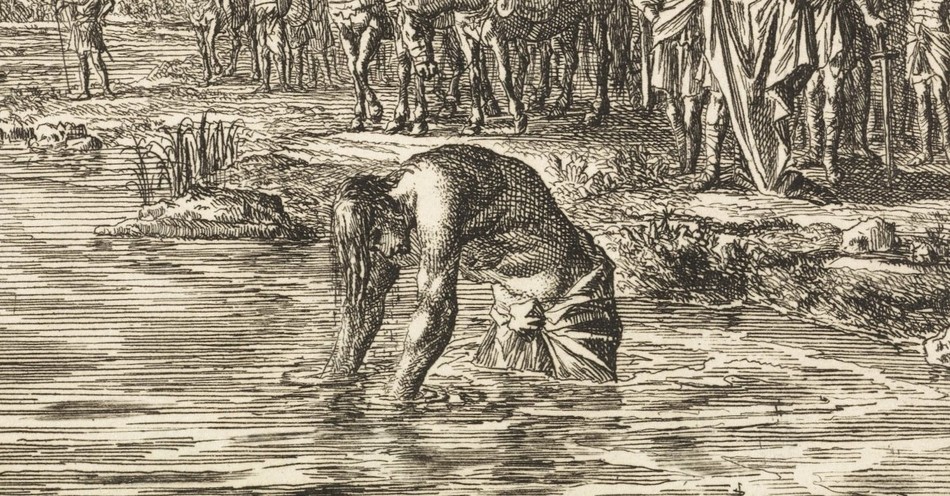Naaman is one of those biblical characters whose story you’ve probably heard but didn’t latch onto his name. He lived during the Old Testament and was associated with Elisha, one of the most powerful prophets ever.
Naaman wasn’t an Israelite, but he had an interesting encounter with the God of Israel when he went to Elisha to help with a disease that had torn his life apart. His story is a story of humility and listening to God, even when God asks us to do things that we don’t necessarily feel up to doing. We will explore his story, his disease, and what we can learn from him today.
What Is the Story of Naaman in the Bible?
Before we can dive into Naaman’s story, we need to understand Naaman himself. As mentioned before, he isn’t an Israelite. He’s an army commander over the army of Aram—or, as we may know it today, Syria.
Syria was sometimes at odds with Israel, but it didn’t appear to be so during the time of the prophet Elisha, who was knee-deep in the period of Israeli kings. Or at least, Israel had bigger problems to contend with its ever-corrupt list of kings. The Lord seems to have smiled upon Aram during Naaman’s time as a war commander, and all greatly regard him.
That is, until he gets a disease, leprosy. We do have to understand that the ancient civilizations had limited wording for skin diseases. So, leprosy could’ve been a host of different types of ailments, but no matter what type . . . it always left that person a pariah. They had to live on the outskirts of cities and could not go into holy places or interact with people.
A slave girl, captured from Israel, speaks to Naaman’s wife about a prophet who is in the Northern Kingdom of Israel, Samaria. She says that he would have the ability to help heal Naaman.
Word passes along to Naaman, who asks the king of Aram for aid. The king of Aram sends a letter to the king of Israel along with a hefty bribe to heal Naaman. Coming from a pagan background, the king was probably used to pagan priests who had to be paid upfront before offering sacrifices or performing a miracle. He also had special reasons for the healing to happen. Lepers were seen as unclean and frequently lived in isolation, so Naaman probably couldn’t lead any campaigns in his condition. The king wanted his best commander healed up so they could continue their conquests.
The king of Israel is puzzled by the letter, as the king himself couldn’t heal people. He’s worried Syria is trying to start a war against him.
When Elisha hears about this, he has Naaman come to his house. When Naaman arrives, Elisha tells him to wash himself seven times in the Jordan River.
The Jordan River was apparently not known as a clean river. Naaman found it disgusting. As a higher official, Naaman assumed he’d get the “celebrity treatment” and a better miracle—better than being told to wash off in some mucky river. So he stormed off.
His servants convince him to follow Elisha’s words. Begrudgingly, he washes himself seven times and is instantly healed. Elisha refuses to accept payment for this miracle, and Naaman acknowledges that because of this, God is the one true God.
Was Naaman Cursed with Leprosy for His Sins?
We see some instances in the Bible where people are struck with ailments for doing wrong things. For instance, Herod is eaten by worms (or, in the case of what some scholars deem, a terrible intestinal disease) when he claims to be a god (or doesn’t stop people from saying he’s one). Asa gets foot disease due to his disobedience. Miriam is struck with leprosy when she talks out against Moses’ foreign wife. It would’ve been the prevailing thought in Old and New Testament times that someone had a disease because they’d done something wrong.
But there are other cases in the Bible where people are diseased through no fault of their own. In the case of Job, he’d done nothing wrong, so we must exercise caution when we automatically assume that someone earned their sickness or disease. After all, Jesus made it clear when he healed people that not all of them had done something to earn their ailments; they only had such ailments to see the power of God through the miracle.
In the case of Naaman, Scripture is silent on whether he had done something wrong. All 2 Kings 5 wants us to know is that he had a disease, and the Lord had healed it.
Some Jewish scholars have explained Naaman’s “curse” or disease in rabbinical literature, such as the Talmud and Midrash.
They look at the woman he’d captured from Israel—who he makes a slave for his wife. God is very clear in the Old Testament that he’s against his people being taken into captivity. Especially after Israel had spent so much time in Egypt as enslaved people, God made his thoughts clear in Levitical law. So perhaps he had been struck down because he’d wrongfully captured the Israelite woman. Elisha never seems to indicate one way or another when he tells Naaman to wash himself. But Elisha does seem to see the real problem with Naaman: his pride.
Naaman thought he deserved the best treatment. Being upper class, he’d probably been used to a very comfortable life where people handed him the best of things.
Whether or not Naaman’s disease had been brought on by his wrongful kidnapping of the girl, pride, or just mere circumstances, he comes out the other end humbled and praising God.
Lessons from the Story of Naaman in the Bible?
The story of Naaman can teach us a lot about ourselves. Naaman, being a somewhat enemy of Israel, had quite the nerve to ask a prophet of Israel for a miracle, especially after he’d captured one of their own. But God obliged him—although not in the way he expected. If we truly analyze the passage with contrite hearts, we can gather two important life lessons from Naaman, perhaps seeing our need for humility as well.
Naaman had a pride problem: If we’re honest, so do we. We often think our lives should go a certain way. We tend to be very upset with God when disease or other difficult circumstances seep into our lives. We forget that we live in a fallen world and have contributed to the fallen nature of it. We don’t deserve healing or deserve anything. A lot of times, God takes a crack at our pride. When we find ourselves in difficult circumstances, that pride ebbs away. In the same way Naaman needed to wash in the Jordan, we all have our versions of the Jordan River. May we accept the need to humble ourselves to be cleaned.
Naaman wanted God to work in a certain way: It’s funny that the King of Aram tried to bribe the King of Israel for this miracle to be done. Even after Naaman praises God, he tries to pay Elisha. He doesn’t fully get the big picture. He can’t use wealth or status to get what he wants in this situation. In the same way, although not all of us are wealthy (the article's writer is certainly far from it), we may try to bribe God. With promises, offerings, prayers…when God owns everything we have. We cannot sway him with our possessions, time, none of it.
If we’re honest, we can sometimes be a lot like Naaman. We dare to ask for more when we’ve committed great sins, and then we get mad at God for his solutions to our problems. May we wash in the Jordan River and let God transform us in the only ways he can.
Photo Credit: public domain illustration (printed by Jan Luken, via Wikimedia Commons)
Hope Bolinger is an acquisitions editor at End Game Press, book editor for hire, and the author of almost 30 books. More than 1500 of her works have been featured in various publications. Check out her books at hopebolinger.com for clean books in most genres, great for adults and kids. Check out her editing profile at Reedsy.com to find out about hiring her for your next book project.
This article is part of our People of Christianity catalog that features the stories, meaning, and significance of well-known people from the Bible and history. Here are some of the most popular articles for knowing important figures in Christianity:
How Did the Apostle Paul Die?
Who are the Nicolaitans in Revelation?
Who Was Deborah in the Bible?
Who Was Moses in the Bible?
King Solomon's Story in the Bible
Who Was Lot's Wife in the Bible?
Who Was Jezebel in the Bible?
Who Was the Prodigal Son?








